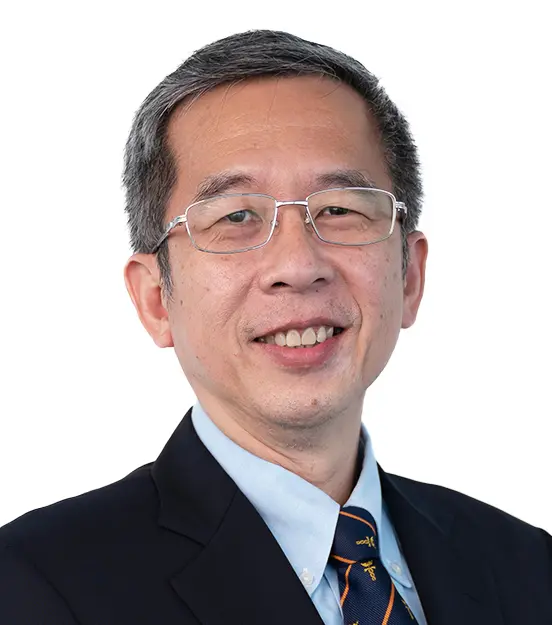Adj Prof Lau Tang Ching
ORCID: 0000-0003-1810-0926
Appointment(s)
Senior Consultant, Division of Rheumatology, Department of Medicine, National University Hospital
Vice-Dean (Education), Yong Loo Lin School of Medicine, National University of Singapore
Group Director Education Office, National University Health System
Degree(s)
MBBS, National University of Singapore (Singapore) 1991
Master of Medicine (Internal Medicine, NUS) 1997
Membership Royal College of Physicians (UK), 1997
Fellow of Academy of Medicine, Singapore (Rheumatology) 2002
Master of Medical Science in Clinical Epidemiology (University of Newcastle, Australia) 2003
Fellow of the Royal College of Physicians (Edinburgh) 2004
Graduate Diploma in Acupuncture (MOH accredited) 2007
Doctor of Philosophy in School of Biomedical Sciences and Pharmacy, Faculty of Health and Medicine (University of Newcastle, Australia) 2020
Biography
Adjunct Professor Lau Tang Ching is a Senior Consultant Rheumatologist in the Division of Rheumatology, Department of Medicine in the National University Hospital. He has been appointed as the Vice-Dean (Education) of NUS Yong Loo Lin School of Medicine in June 2017 and Group Director of the National University Health System Education Office in February 2018. He graduated in 1991 from the National University of Singapore and obtained his Membership of the Royal College of Physician in United Kingdom and the Master of Medicine (internal medicine) degree in 1997. He is a fellow of the Academy of Medicine Singapore since 2001.
He also holds both a Master of Medical Science degree in Clinical Epidemiology and a Doctor of Philosophy in School of Biomedical Sciences and Pharmacy, Faculty of Health and Medicine (University of Newcastle, Australia), a fellow of the Royal College of Physicians (Edinburgh) and a Graduate Diploma in Acupuncture (Singapore).
His main research interests are in Osteoporosis, Pharmacoeconomic Evaluation, Medical Education and Evidence Based Medicine. He has helped to coordinate the Health Service Development Program for osteoporosis (HSDP) in 2003 to 2007 in the NHG cluster, which was successful in improving adherence and reducing the recurrent fracture rates of patients who were at high risk of recurrent fractures. He is helping to coordinate the Osteoporosis Disease Management Program (OPTIMAL), which is an extension of the previous HSDP osteoporosis program.
Selected Publications
Development of the Asia Pacific Consortium on Osteoporosis (APCO) framework: clinical standards of care for the screening, diagnosis, and management of osteoporosis in the Asia-Pacific region (Osteoporosis International, (2021), 32, 7, (1249-1275), 10.1007/s00198-020-05742-0). Osteoporosis International, 32(7), 1277-1278.
Chandran, M., Mitchell, P. J., Amphansap, T., Bhadada, S. K., Chadha, M., Chan, D. C., . . . Zhao, Y. L. (2021).
Secondary prevention of fragility fractures in Asia Pacific: an educational initiative. Osteoporosis International, 31(5), 805-826.
Ebeling, P. R., Chan, D. C., Lau, T. C., Lee, J. K., Songpatanasilp, T., Wong, S. H., . . . Williams, M. (2020)
Entrustable professional activities in health care education: a scoping review. Medical Education, 53(8), 766-777.
Shorey, S., Lau, T. C., Lau, S. T., & Ang, E. (2019)
Cost of Osteoporotic Fractures in Singapore. (2017). 12, 27–35.
Ng CS, Lau TC, Ko Y
The health and economic burden of osteoporotic fractures in Singapore and the potential impact of increasing treatment rates through more pharmacological options. Archives of Osteoporosis, 14(1).
Chandran, M., Lau, T. C., Gagnon-Arpin, I., Dobrescu, A., Li, W., Leung, M. Y. M., . . . Zhao, Z. (2019)
Nurse-Physician Communication Team Training in Virtual Reality Versus Live Simulations: Randomized Controlled Trial on Team Communication and Teamwork Attitudes. JOURNAL OF MEDICAL INTERNET RESEARCH, 22(4), 9 pages.
Liaw, S. Y., Ooi, S. W., Bin Rusli, K. D., Lau, T. C., San Tam, W. W., & Chua, W. L. (2020).
Wow, woo, win"- Healthcare students' and facilitators' experiences of interprofessional simulation in three dimensional virtual world: A qualitative evaluation study. NURSE EDUCATION TODAY, 105, 6 pages.
Liaw, S. Y., Choo, T., Wu, L. T., Lim, W. S., Choo, H., Lim, S. M., . . . Lau, T. C. (2021).
Impact of a longitudinal student-initiated home visit programme on interprofessional education. Asia Pacific Scholar, 7(4), 1-21.
Leung, Y. C. G., Ng, K. Y. Y., Yow, K. S., Ngiam, N. H. W., Yeo, D. G. D., Tey, A. J. Y., . . . Wong, C. H. (2022)
Response and Lessons Learnt Managing the COVID-19 Crisis by School of Medicine, National University of Singapore
Dujeepa D Samarasekera, Denise Li Meng Goh, Su Ping Yeo, Nicola Siew Pei Ngiam, Marion M Aw, Mei Mei Lim, Suresh Pillai, Shuh Shing Lee, Malcolm Mahadevan, Alfred Kow, Yap Seng Chong, Tang Ching Lau (2020)
Leadership and management in medical and health professions' education: Why do I need to lead?. In Educate, Train, Transform: Toolkit on Medical and Health Professions Education (pp. 163-198).
McKimm, J., Forrest, K., Jones, P., & Lau, T. C. (2021).
Adapting undergraduate paediatric medical education to the challenges of COVID-19 pandemic: perspective of NUS Medicine
Tang Ching Lau, Yap Seng Chong, Benny Kai Guo Loo, Sashikumar Ganapathy, Jeremy Meng Dao Ho, Shuh Shing Lee, Jillian Yeo, Dujeepa D Samarasekera, Denise Li Meng Goh (2021)
Cost-effectiveness of selective bone densitometry using the osteoporosis self-assessment tool for Asians in multi-ethnic Asian population
Chong, B., Ganesan, G., Lau, T.C. (2022)
Medications impact different aspects of the quality of life of patients with systemic lupus erythematosus
KP Leong, JCW Tan, BYH Thong, TY Lian, ET Koh, KO Kong, WG Law,... TC Lau. (2023)
Symptom appraisal and help-seeking among patients with autoimmune rheumatic diseases: A qualitative study
Xiang L; Yoon S; Low AHL; Leung YY; Fong W; Lau TC; Koh DR; Thumboo J (2023)
Transforming healthcare with integrated inter-professional education in a research-driven medical school
Samarasekera DD; Chong YS; Ban K; Lau LST; Gallagher PJ; Zhi Xiong C; Müller AM; Ngiam NSP; Wong ML; Lau TC (2024)

